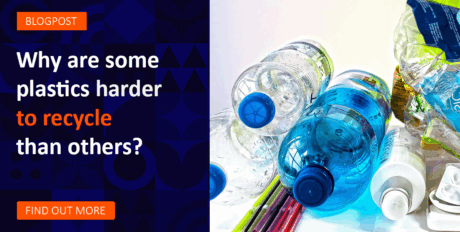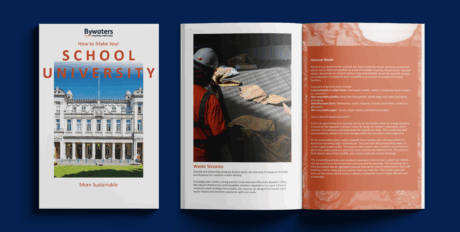Contact us today for your Free Quote
Did you know that the education sector is thought to produce nearly 700,000 tonnes of waste every year? Sustainability and recycling training is critical to ensure an environmentally-friendly future, and the educational sector is no exception. In fact, it is one of the most important parts of society to engage this matter with.
The United Kingdom has over 30,000 schools and over 150 universities, most of which have campus facilities that generate waste and largely require optimised recycling practices, both to maintain sustainable operations as well as to educate future generations on the impact it has on our planet.
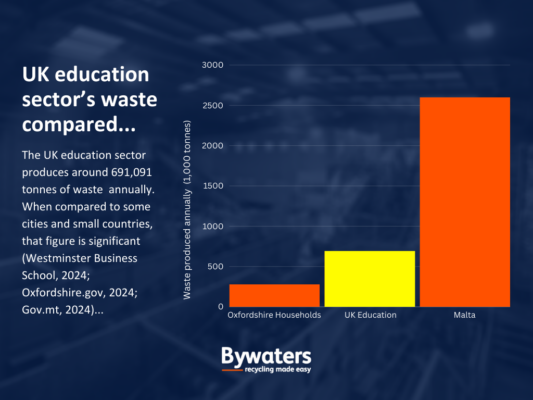
School & University Waste Facts…
A report suggests that the entire education sector is thought to produce nearly 700,000 tonnes of waste annually. Meanwhile, another study indicates that the university sector alone produces around 250,000 tonnes of waste every year.
Food, paper and cards are thought to account for a substantial portion of the schooling system’s waste production, comprising 70% of the total. Even though 80% of this waste is recyclable, actual recycling rates stand at around 20%. Additionally, another source suggests that primary schools generate an average of 45 kg of waste per pupil, while secondary schools are thought to generate 22 kg of litter per student.
Despite these staggering figures, they showcase the opportunity in optimising our educational institutions’ waste management. With that being said, this article will provide guidance for schools, universities and other educational institutions to manage their waste sustainably. The topics covered in this article will include the importance of waste management for the sector, common types of waste produced and how to deal with them to make your facility more sustainable.
Why is Recycling Important for Schools & Universities?
Recycling has some significant benefits for the education sector’s stakeholders, with some being more surprising than others…
Environmental Responsibility
First and foremost, as mentioned, schools generate a significant amount of waste. By implementing proper recycling and reduction strategies, schools can divert waste from landfills, conserve resources and minimise their environmental footprint. This sets a positive example for students, promoting a sense of environmental responsibility.
Saving Money
Inefficient waste management is also expensive for schools. Food waste, for instance, is a major contributor to school waste and often carries a particularly high disposal cost. Local authorities are thought to spend £250 million every year to dispose of food waste. Furthermore, the Landfill Tax is a notably avoidable cost for non-recyclable waste, with estimates suggesting that more sustainable practices could save around £6.4 million for local authorities.
When you have more sustainable waste management systems in place, your waste becomes cheaper to get rid of.
Improved Image & Standards
Aside from improving student and staff wellbeing, schools that prioritise sustainability and demonstrate a commitment to environmental responsibility can project a positive image to the wider community, as well as gain additional credibility whenever working on projects or initiatives with external stakeholders.
Education Grants & Financial Incentives for Sustainability
More interestingly, there are many grants and financial incentives that reward educational institutions with solid sustainable strategies. From general guides such as Grants4Schools to more sustainability-specific schemes such as Tel Group’s £1,000 Go Green Scheme, opportunities for funding vary greatly and some do not have to be strictly fixed to certain criteria.
With this in mind, it is in our schools’ best interests to have a solid, environmentally-conscious waste strategy, but how do we begin? In the next section, we shall analyse some common types of waste produced in the sector. Moreover, we shall provide our recycling expertise for how to best dispose of these items.
Before we start, check out our Recycle page to familiarise yourself with the diverse types of waste streams. This may prove beneficial to understand the next section. It is also a useful list to understand how waste is sorted into separate streams.
Dealing With Common School & University Waste Streams
It’s needless to say that the types of waste produced vary greatly between different institutions’ operations. As mentioned earlier, 70% of the waste generated in schools comprises of food, card and paper. We will start with the waste streams of these items to begin this discussion.
Dry Mixed Recycling: Recycling Bins in Schools & Universities
Odds are you will encounter something that belongs in the Dry Mixed Recycling bin in any given day. From plastic bottles to cardboard packaging, DMR items often include the usual objects that you would expect to belong in the recycling bin.
Clear Signage & Recycling Poster Ideas
It is useful to know that implementing a clear system for separating these recyclables from non-recyclables is a highly effective strategy for reducing waste management costs. If it helps your building, we have a variety of posters that list items and whether they’re accepted in the respective waste stream or not. Click here to check them out now.
Avoid Contamination: Make Sure They’re Clean
Make sure that your recyclable litter is clean and free from contaminants such as food. Otherwise, this will contaminate the whole recycling batch. As a rough estimate, even a minor contamination rate of approximately 5% within recycling bins can jeopardize the entire batch, rendering it unsuitable for recycling processes.
How To Recycle Plastic
Another thing worth mentioning is that not all plastic is equally recyclable. Plastics come in different types, varying in composition. Plastic items usually have a small numbered recycling symbol somewhere, to identify what type of plastic it is. If you’re having difficulty figuring out what type of plastic you’re dealing with, and whether it is recyclable, we created a table to identify common plastic resin identification codes, as well as whether they’re widely recycled in the UK.
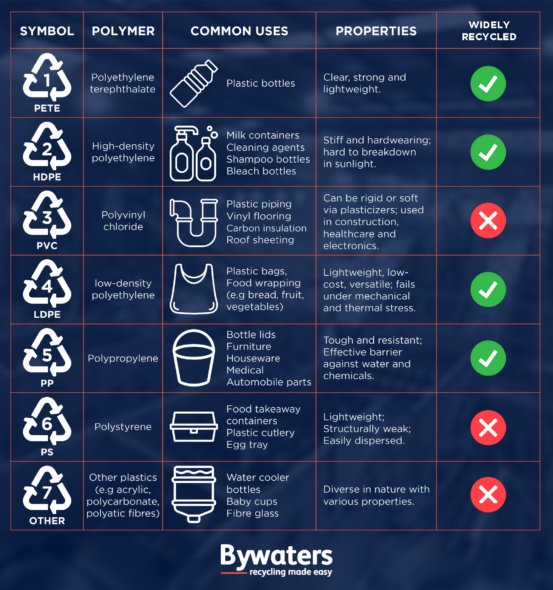
Regarding plastic, Bywaters has also created a more comprehensive guide to understand plastic waste management. Click here to read the full guide.
General & Non-Recyclable Waste: Landfill Tax Regulation
General (or non-recyclable) waste refers to items thrown away that cannot be recycled. From composite plastic folders to pens to certain beverage cartons, examples of this waste stream’s items can vary greatly.
In the UK, these items previously were disposed of by sending them to landfills. However, this disposal method is quickly falling out of favour due to its risks for the ecosystem and space use, with many councils announcing pledges to steer away from it. Non-recyclable waste is increasingly being processed in alternative ways.
WfI Facilities
The improvement of waste processing technologies have allowed for WfI facilities to become increasingly used. In these facilities, a thermo-chemical process is used to break down waste and capture its energy potential. Through this means, schools can help avoid the previously mentioned cost of Landfill Tax, as well as its potentially hazardous implications.
Bywaters has developed a strategy to process this waste as sustainably as possible. Through a specialised partnership, this material gets sent to WfI facilities, helping to power 144,000 homes across Britain. For every tonne recovered with us, 675.89 kWh of energy is produced.
School Food Waste: Disposing It Sustainably
Food waste is often an issue in many educational facilities, this may be due to food scraps from preparation, spoiled food or simply lunches being uneaten. WRAP has previously frequently reported it as a significant fraction of total waste.
It is often said that 33% of all food produced goes to waste. On top of that, food waste is generally a significant contributor to climate change. Studies suggest we would be able to cut between 6% and 8% of all man-made GHG emissions by preventing food waste.
While composting has traditionally been a popular way of tackling food waste, anaerobic digestion (AD) has some key advantages as a sustainable disposal means.
Anaerobic Digestion & Composting: What’s The Difference
Anaerobic digestion is a process that utilises microorganisms to break down biodegradable materials in an oxygen-deprived environment.
Anaerobic digestion (AD) boasts a key advantage: its lower greenhouse gas (GHG) emissions. This process recovers valuable biogas. While composting offers a simpler setup, its energy output is miniscule in comparison to AD. Moreover, composting generates some emissions and odours and has a larger footprint. Bywaters partners with a strong network of expert anaerobic digestion plants, as part of its pledge to support the circular economy. Click here to find out more.
Project Idea: Make Use of Food Waste with Wormeries
Additionally, setting up a wormery is a great idea for an independent project that offers numerous benefits for schools, both for waste management and education. They provide hands-on science learning, reduce organic waste, create nutrient-rich compost for gardens and foster environmental responsibility. This practical, cost-effective project engages students while teaching them about ecosystems and sustainability.
Project Idea: Cultivating Well-Being with Allotments
Moreover, school allotments are another great option for outdoor sustainable classroom projects. Students can learn about food production, healthy eating and environmental sustainability. Practical skills, like planting and harvesting, develop alongside a deeper appreciation for nature. Allotments promote well-being and can provide fresh produce for your campus community.
Cardboard Recycling: Balers Can Save You Money
While cardboard can be recycled with DMR, if your campus produces a lot of it, it may save you money to invest in a baler to sort them separately. Recycling balers compress recyclable materials like cardboard into dense cubes. This makes them easier to transport and store, maximising space and efficiency. More importantly, facilities are able to get a rebate on the cardboard they produce, making them potentially a means to make money from your waste.
Waste Electrical & Electronic Equipment (WEEE)
Waste Electrical and Electronic Equipment, otherwise known as WEEE, is another big waste stream to take into account nowadays. It is important to know the different phases involved when recycling complex electrical items. The process varies depending on the facility, however we’ve attached Bywaters’ WEEE recycling journey below to illustrate how we process these materials as sustainably as possible.
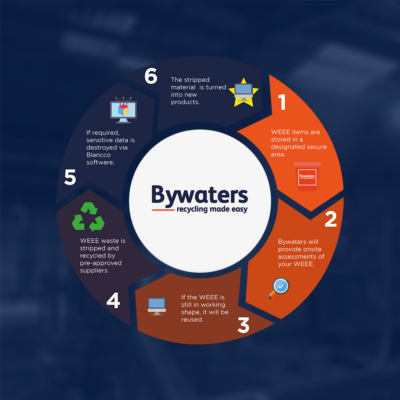
We’ve created a comprehensive brochure expanding upon the topic and outlining how sustainable companies like Bywaters process WEEE. Click here to find out more.
Working with Reuse Companies Build a Reputation
Studies suggest that the carbon footprint of manufacturing a new laptop is about 331 kg of CO2e, being a cost for both our educational institutions and the environment. That being said, if you’re trying to dispose of less damaged equipment, just think about how much of a positive impact finding the right reuse options could be for everyone.
By working with Bywaters’ specialised reuse services, whether it be to find usable equipment or donating neglected items, it can build your educational institution’s reputation as a sustainable organisation, as well as reducing costs for its own and other companies’ procurement and disposal costs.
Driving Sustainability Engagement with Waste Awareness Days
Last but not least, providing recycling education and maintaining this engagement is central to successful sustainability strategies. For clients, Bywaters hosts bespoke Waste Awareness Days precisely for this reason.
These sessions blend education and fun to inspire a strong recycling culture. Participants learn firsthand about waste challenges and solutions. Combined with Bywaters’ expertise, these events cultivate behaviours focused on protecting our environment.
Specialised Recycling Solutions for Universities and Schools…
Reducing waste and its eco-friendly management is central to building a better future. That is why here at Bywaters we are committed to offering advanced recycling solutions and bespoke in-depth consultations to improve the sustainability of educational institutions.
If you are a university or school facility interested in improving its sustainable waste management operations, contact us today to see how our wide-ranging recycling services we can help you.
More posts:
Valentine’s Day: History, Tradition, and Its Modern Impact
This post traces the evolution of Valentine’s Day from ancient Roman rituals to a global commercial event. It highlights the holiday’s hidden environmental impact and offers a guide to celebrating sustainably through “Circular Romance” and waste reduction.
Read morePlastic Recycling: Why Are Some Types Harder to Process Than Others?
Some plastics recycle easily, while others are difficult or impractical to process at scale. This article explains why material type, packaging design, contamination and recycling infrastructure all play a role, and what businesses can do to improve plastic recycling outcomes in the UK.
Read moreThe Ultimate Guide For a Sustainable School and University
Download The Ultimate Guide For a Sustainable School or University. Get the roadmap to cut costs, reduce your carbon footprint, and boost your ESG profile with 5 core pillars.
Read more

